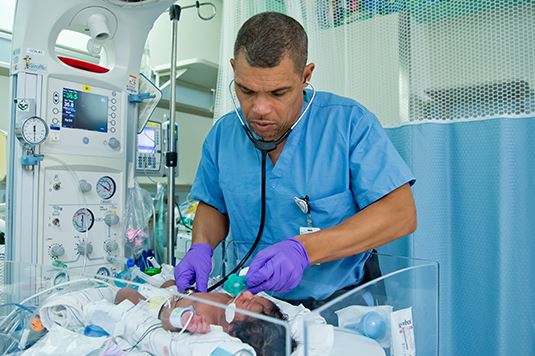
Open Accessibility Menu
Hide
dfh
Close Alert
Close Alert
Author: James McGuire, MD
Specialty:
Neonatology

Because no two people are the same, no two pregnancies and births are the same. Some babies are born healthy and ready to take on the world. Others need a little medical help to get them to that point. It’s for this reason that we classify neonatal care according to the needs of infants.
You may be familiar with Neonatal Intensive Care Units, or NICUs for short. But did you know that there are actually four distinct levels of infant care that American hospitals and medical centers provide?
Level I – Well-baby Nursery
Infants that are born more or less healthy receive care in a well-baby or well newborn nursery. These units are typically staffed with physicians, nurse practitioners and advanced practice registered nurses who are able to provide care and stabilize infants who are born at 35 to 37 weeks’ gestation or greater or who have minor illness. Level 1 care is usually provided in the mom’s room. Babies who need more than level 1 care are transferred.
Level II – Special Care Nursery
In addition to being able to provide the care of a Level I nursery, these units specialize in caring for infants who are born prematurely at 32 weeks’ gestation or greater or are underweight or are moderately ill. Additionally, babies who are born more premature than 32 weeks’ gestation are transferred back to a level II nursery for convalescent care after being treated in intensive care units. At Washington Hospital, we’re able to provide these important services within our Level II Special Care Nursery. This allows us to keep babies in their community where they are closer to their families’ support networks while infants get strong and healthy enough to go home. Our staff consists of pediatric hospitalists and neonatologists, along with specially trained nurses and respiratory care practitioners. Babies who need more than level II care are stabilized before being transferred to an intensive care unit.
Level III – Neonatal Intensive Care (NICU)
These units care for infants born at all gestational ages and babies born with critical illnesses. In addition to providers found in Level I and Level II nurseries, Level III nurseries have pediatric surgeons, anesthesiologists, ophthalmologists and other pediatric subspecialists on staff who are able to provide comprehensive care, respiratory support, and sustained life support for infants.
Level IV – Regional NICUs
NICUs are equipped to provide the most acute care for babies with serious and complex congenital or acquired conditions. In addition to its advanced surgical capabilities, Level IV nurseries are staffed by a full range of pediatric medical and surgical subspecialists who specialize in the care of very sick babies.
While Washington Hospital does not have Level III or Level IV NICU facilities, our close relationship with UCSF Health gives us access to one of the top-ranked NICUs in the country. In fact, in addition to serving as a neonatologist and as the medical director for Washington Hospital’s Special Care Nursery, I’m also a professor in the UCSF Department of Pediatrics.
Because it’s the only Level II nursery in the area and because of our affiliation with UCSF Health, babies born at Washington Hospital can receive emergency treatment and be stabilized before being transferred to more advanced facilities, such as the Intensive Care Nursery at UCSF Benioff Children’s Hospital in San Francisco. More importantly, after receiving care in a NICU, infants can then be transferred back to Washington Hospital to convalesce before discharge.
By having this resource in the community, it lessens the burden on parents to navigate traffic and rearrange their schedules to see their newborns in other facilities during an already stressful time.
Learn more about the comprehensive pregnancy and birthing services as well as the Special Care Nursery found at Washington Hospital by visiting whhs.com.
Posted November, 2018